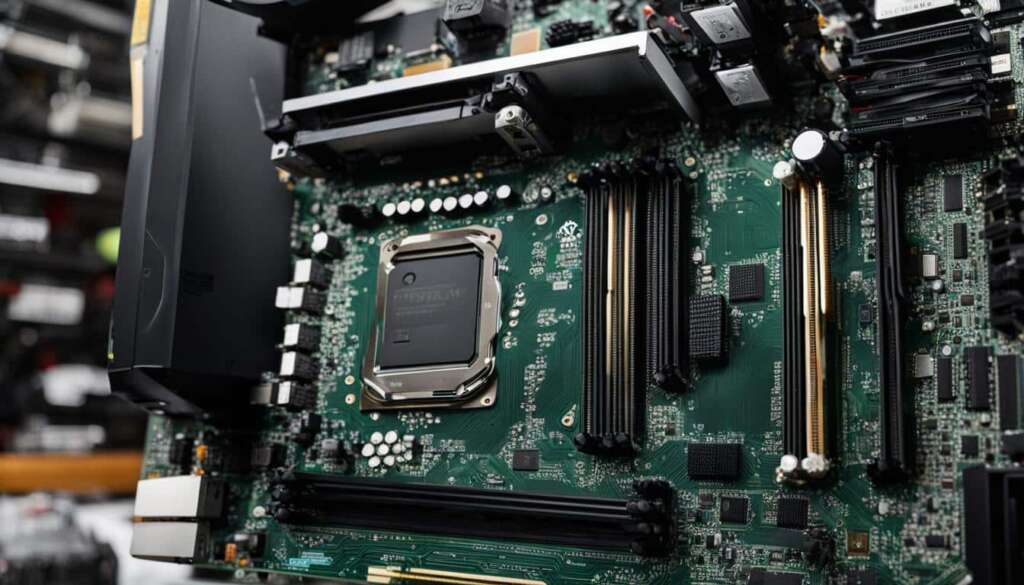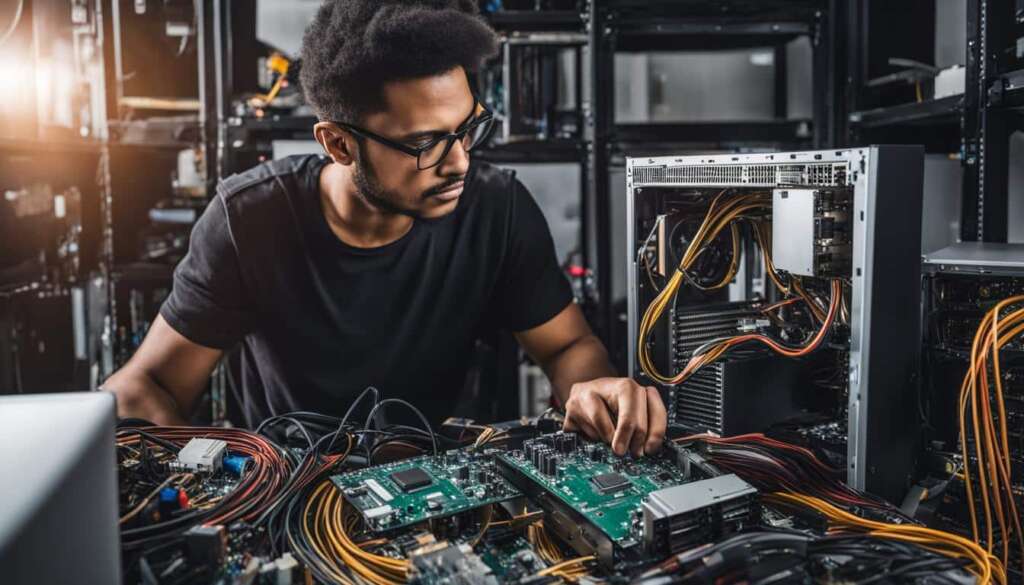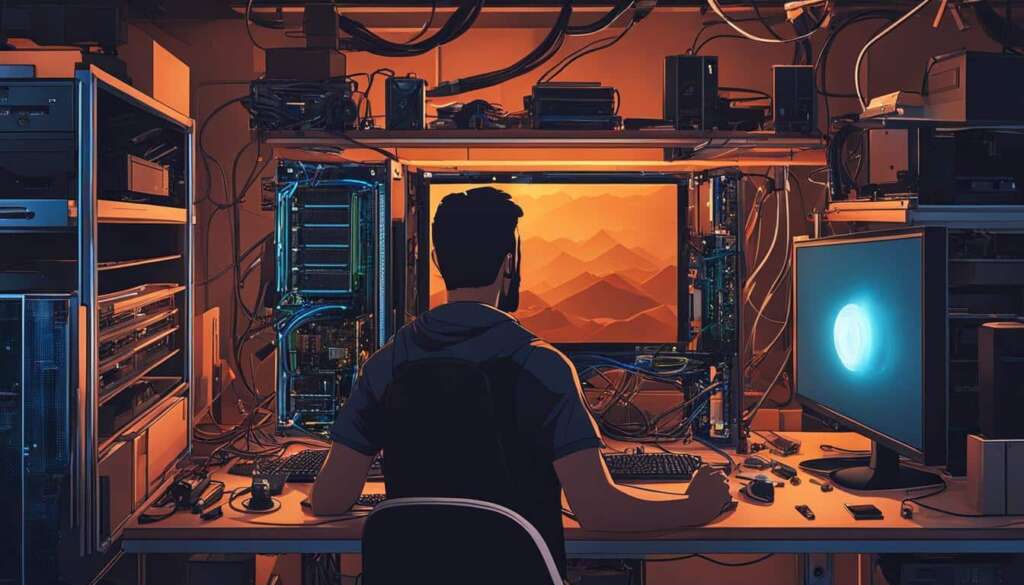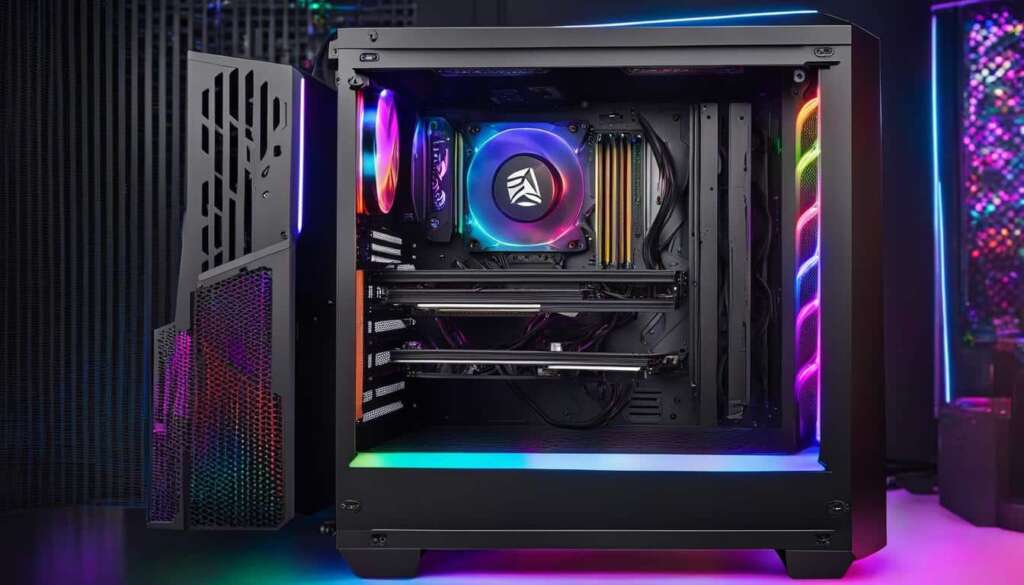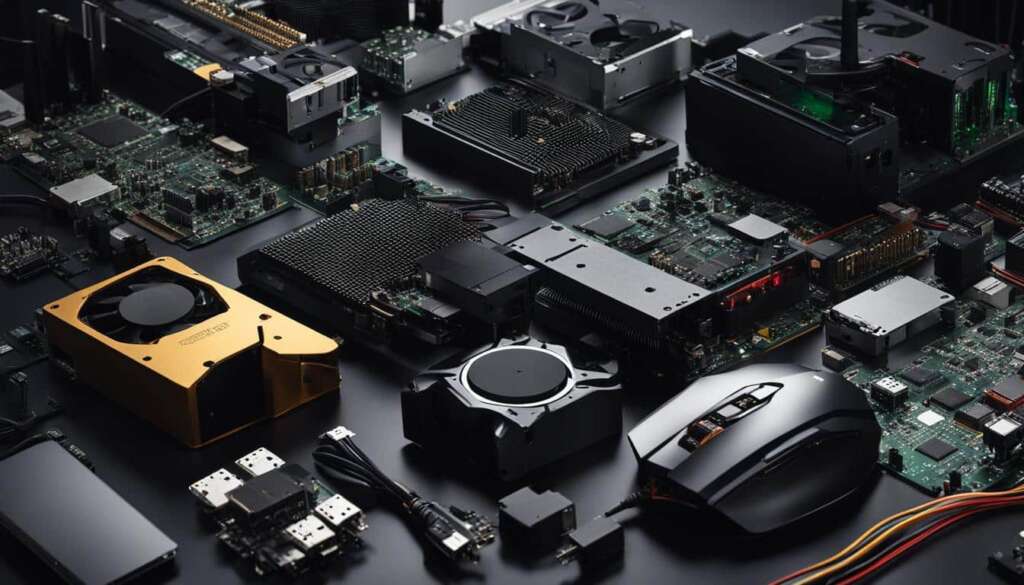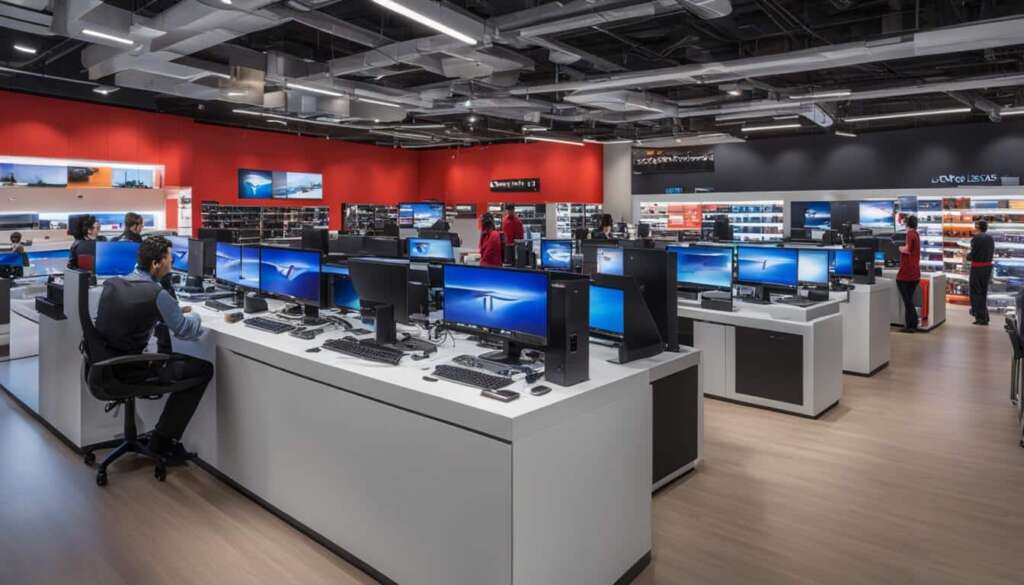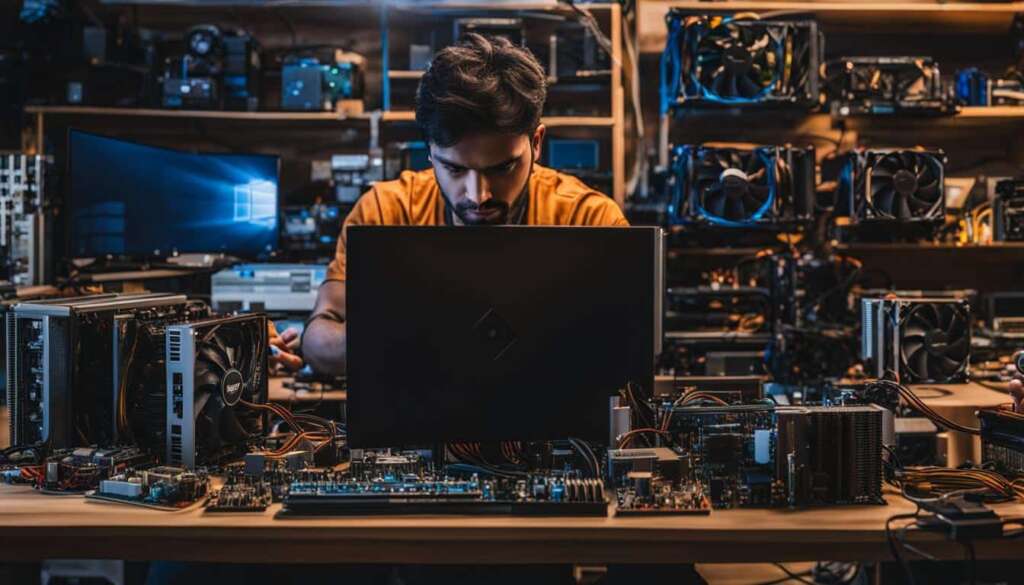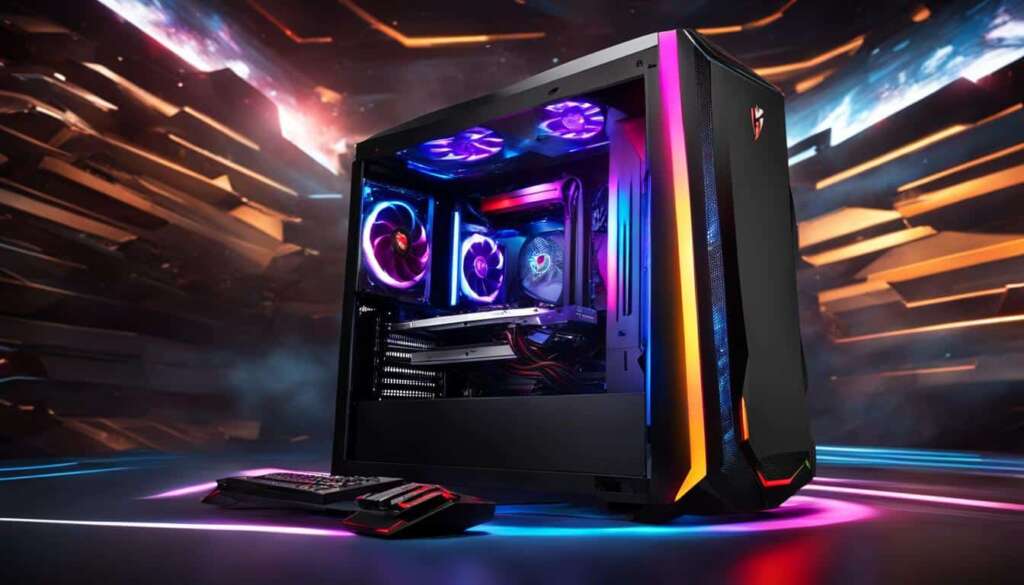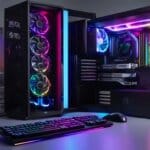Table of Contents
Building your own computer may seem like a daunting project, but it doesn’t have to be. In this guide, we’ll explain how to build a PC step by step, starting with understanding your needs and exploring the different parts of a computer. We’ll also provide recommendations for each component and tips for building your own PC. Whether you’re a gamer, a student, or someone who uses their computer for everyday tasks, this guide will help you make informed decisions about the essential computer parts you need.
What to Consider Before Building a PC
Before you embark on the exciting journey of building your own PC, there are a few important factors to consider. These considerations will help you make informed decisions about the computer parts you need, ensuring that your PC build meets your requirements and fits your budget.
1. Determine your purpose
First and foremost, you need to determine what you will be using your PC for. Whether it’s gaming, work, or general use, your purpose will dictate the type of computer parts and performance you require. For example, if you’re a gamer, you’ll need a powerful processor and graphics card to handle demanding games. If you’re using your PC for work, you may prioritize a fast processor and ample storage for large files.
2. Set a realistic budget
Setting a budget is crucial when it comes to building a PC. The amount you spend on computer parts can vary greatly, so it’s important to have a realistic budget in mind. Consider what you’re willing to invest in your PC build and prioritize the components accordingly. Remember to allocate funds not only for the major components like the processor and motherboard but also for peripherals and upgrades.
3. Research hardware components
Before you start shopping for computer parts, take the time to research and understand the different hardware components you’ll need for your PC build. Familiarize yourself with terms like motherboard, processor, memory, storage, and case. Each component plays a crucial role in the overall performance and capabilities of your PC. By gaining knowledge about these components, you’ll be able to make informed decisions and choose the right parts for your needs.
By considering these factors – purpose, budget, and research – you can confidently select the computer parts that are best suited to your requirements. With the right components in hand, you’ll be one step closer to building your own custom PC.
| Component | Considerations |
|---|---|
| Motherboard | Choose a motherboard that is compatible with your desired processor and has the necessary expansion slots and connectors for future upgrades. |
| Processor | Consider the number of cores, clock speed, and cache size to ensure optimal performance for your intended use. |
| Memory (RAM) | Determine the amount of RAM needed based on your multitasking requirements and the memory compatibility with your motherboard. |
| Storage | Choose between a traditional hard disk drive (HDD) for larger storage capacity or a solid-state drive (SSD) for faster data access. |
| Case | Select a case that accommodates all your components, has adequate cooling options, and suits your aesthetic preferences. |
Choosing the Right Computer Parts
When it comes to building your own PC, choosing the right computer parts is crucial for optimal performance. Here, we will discuss the essential components you need to consider and provide guidance on selecting the right parts for your needs and budget.
Motherboard
The motherboard is the foundation of your PC and determines the compatibility of other hardware components. Consider factors such as the socket type, RAM slots, expansion slots, and connectivity options when choosing a motherboard. It is recommended to opt for a reputable brand and ensure compatibility with your desired processor.
Processor
The processor, also known as the CPU, is responsible for executing instructions and performing calculations. Factors such as the number of cores, clock speed, and performance benchmarks should be considered when selecting a processor. Determine your usage requirements and budget to find the right balance between performance and cost.
Memory
Memory, or RAM, is essential for multitasking and running multiple programs simultaneously. Consider the capacity and speed of the RAM modules when choosing memory for your PC. Higher capacity and faster speeds can improve overall system performance, especially for resource-intensive tasks like gaming or video editing.
Storage
Choosing the right storage options is vital for storing your operating system, files, and applications. Hard disk drives (HDD) offer larger capacities at a lower cost, while solid-state drives (SSD) provide faster read and write speeds for improved performance. Combining both types of storage can provide the best of both worlds, with SSDs for faster boot times and HDDs for ample storage space.
Case, Fans, and Power Supply
The case houses and protects all the components of your PC. Consider the size, airflow, and expandability options when selecting a case. Additionally, choose reliable and efficient fans to ensure proper cooling and prevent overheating. Finally, select a power supply unit (PSU) that can deliver sufficient power to all your components while considering energy efficiency ratings.
Remember to conduct thorough research and purchase computer parts from reputable sources, whether online or in-store. Compare prices, read reviews, and check for compatibility to ensure a smooth and successful PC building experience.
| Component | Considerations |
|---|---|
| Motherboard | Socket type, RAM slots, expansion slots, compatibility |
| Processor | Number of cores, clock speed, performance benchmarks |
| Memory | Capacity, speed |
| Storage | HDD or SSD, capacity, read/write speeds |
| Case, Fans, and PSU | Size, airflow, expandability, cooling, power efficiency |
By carefully selecting the right computer parts, you can build a PC that meets your specific needs and budget. Whether you’re a gamer, a content creator, or a professional, choosing reliable and compatible components is essential for a successful PC build.
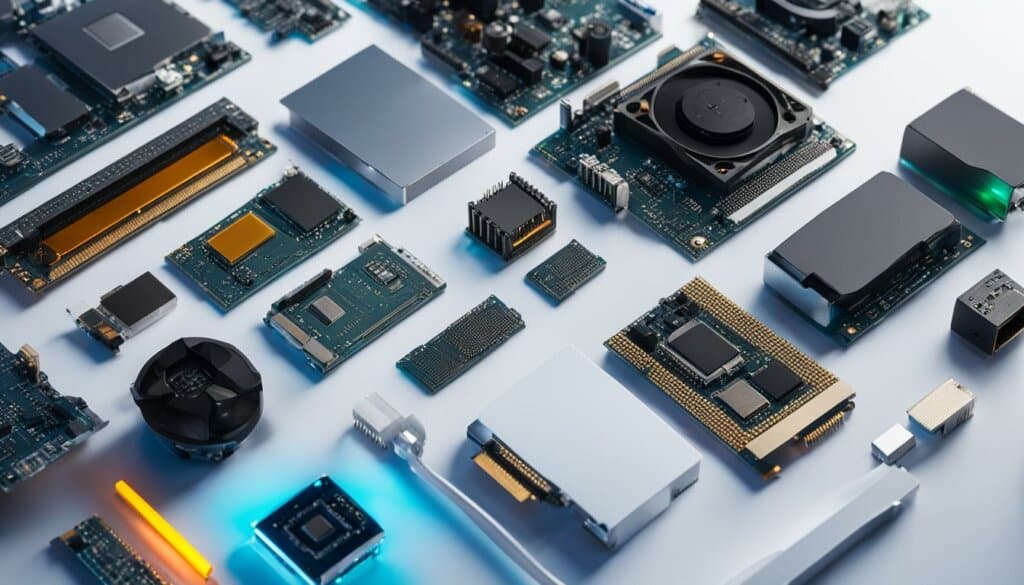
Now that you have a better understanding of how to choose the right computer parts, it’s time to move on to the next section where we will guide you through the process of building your own PC.
Building Your Own PC
Building your own PC can be a rewarding and cost-effective way to get exactly what you need from your computer. Whether you’re a gaming enthusiast, a professional in need of high-performance hardware, or simply want to have full control over your PC’s specifications, building your own system allows you to customize every aspect.
Before you begin building your PC, make sure you have a large workspace and all the necessary tools. Having a clean and organized area will make the process smoother and reduce the chances of damaging any components. Some essential tools you’ll need include a screwdriver, thermal paste, and cable ties to manage the wiring neatly.
The first step in building your PC is installing the processor and power supply onto the motherboard. These components are critical for the overall performance and stability of your system. Once installed, secure the motherboard in the case, ensuring that it aligns with the standoffs to prevent any short circuits.
Next, install the memory (RAM) and storage drives. Make sure to follow the motherboard’s specifications and guidelines for installing these components. It’s advisable to use an anti-static wrist strap during this process to prevent any electrostatic discharge that could damage sensitive components.
After all the hardware is installed, it’s time to test your system. Connect the necessary cables, including the power supply, monitor, keyboard, and mouse. Power on your PC and check if it boots up properly. If any issues arise, double-check the connections and consult the motherboard’s manual or online resources for troubleshooting steps.
Building your own PC allows you to have full control over the components and performance of your system. It also gives you the flexibility to upgrade individual parts as needed. By following the step-by-step instructions and taking the necessary precautions, you can have a fully functional, custom-built PC that meets your specific needs.
Conclusion
Building your own PC is a great way to ensure you have the right computer parts for your needs and budget. By understanding your needs, setting a budget, and choosing reliable computer parts, you can create a custom PC that suits your requirements. Whether you’re a gamer, a student, or someone who uses their computer for everyday tasks, building your own PC gives you the flexibility to upgrade and customize your system as needed.
With a wide range of computer components and accessories available, you can choose the perfect combination of hardware to optimize performance and functionality. From powerful processors to ample storage options, you can tailor your PC to handle demanding tasks or indulge in immersive gaming experiences. By investing in high-quality computer parts, you can ensure the longevity and reliability of your system.
Not only does building your own PC provide a sense of accomplishment, but it also allows for future expansion and customization. As technology advances, you can easily upgrade individual components to stay up-to-date with the latest advancements in computer hardware. Whether you want to add more memory, upgrade your graphics card, or enhance your storage capacity, your DIY PC allows you to adapt to your changing needs.
So, if you’re ready to embark on your PC building journey, armed with the knowledge and understanding of computer parts, components, and accessories, you’re well on your way to creating a personalized computer that meets your exact specifications. Enjoy the process of assembling your own PC and reap the rewards of a system that is perfectly tailored to your computing needs.
FAQ
What are the essential computer parts I need to build my own PC?
The essential computer parts you need to build your own PC include a motherboard, processor, memory, storage, and a case, as well as a power supply and fans.
How do I determine what computer parts I need for my PC build?
You can determine what computer parts you need for your PC build by understanding your needs, setting a budget, and researching the different hardware components available.
Where can I purchase reliable computer parts?
You can purchase reliable computer parts online from reputable sources or from computer hardware shops.
Is it difficult to build my own PC?
Building your own PC may seem daunting at first, but with the right information and tools, it can be a rewarding experience. Following step-by-step guides and taking your time can make the process easier.
Can I upgrade and customize my PC if I build it myself?
Yes, building your own PC gives you the flexibility to upgrade and customize your system as needed, allowing you to keep your computer up to date with the latest technology.

